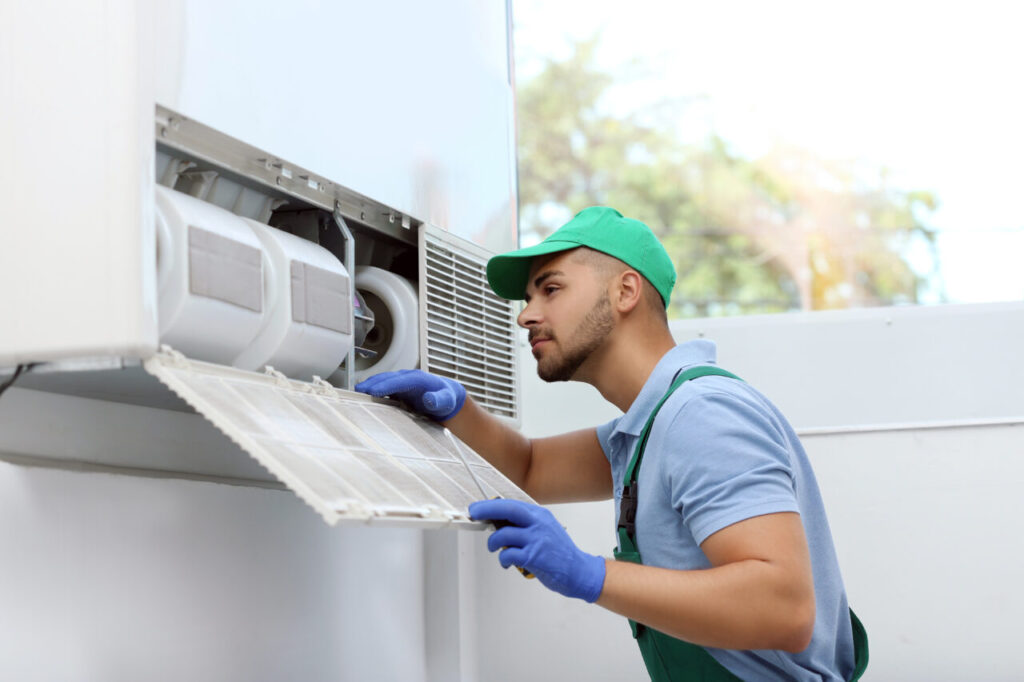Your HVAC system is responsible for heating and cooling your home to ensure comfortable temperatures. However, multiple problems can compromise its efficiency, increasing energy bills, causing regular breakdowns and costly repairs and replacements. The most common HVAC problems may include thermostat malfunctions, mechanical wear and tear, unusual furnace noises, dirty condenser or evaporator coils, water leaks, dirty filters, poor maintenance, and ignition issues.
Thanks to these problems, it can be difficult to pinpoint the precise cause of a breakdown or the system not functioning. You’ll require an HVAC service to diagnose and find a solution to the problem. This article outlines seven different HVAC services you might need at home.
1. HVAC preventive maintenance
Preventive maintenance aims at keeping your HVAC running smoothly without sudden breakdowns, ensuring a reliable and efficient all-season long service while ensuring maximum operating efficiency. It involves inspecting and evaluating your system to make the necessary repairs and adjustments. Preventive maintenance tasks may include checking refrigerant levels, inspecting leaks, checking gas connections for possible leaks, tightening electrical connections, lubricating moving parts, and testing the thermostat to ensure it cycles the system properly, checking air filters and others.
Preventive maintenance ensures fewer repairs, safer equipment, reduced energy bills, extended system life, and prevents unexpected downtime. A professional air conditioner service like Buckeye HVAC helps improve the system’s efficiency.
2. HVAC repairs
HVAC repairs seek to correct breakdowns and malfunctions. HVACs have many moving parts that are constantly working, increasing malfunction risks. To determine if your AC needs repair, look out for warm air blowing from your home’s vents, poor airflow, frequent cycles, high humidity, water leaks, foul odors, or unusual noises.
HVAC repairs involve a general assessment to check the significant components, run the system to spot specific issues, and inspect related parts. The system’s problems are then identified, available options discussed with you then you get a chance to ask questions. Failure to call for repairs immediately may worsen the issues, resulting in more complicated and costly repairs.
3. HVAC inspections
Regular HVAC inspections boost the system’s efficiency and spot potential areas that require immediate repairs before escalating. They’re a thorough assessment and review of your home’s heating and cooling system. Setting a regular HVAC inspection schedule is an excellent way to ensure comfort in your home throughout the system’s life. HVAC inspection services and prices vary from one company to another. You can look at an HVAC inspection checklist online to see what happens during these inspections.
4. HVAC replacement
HVAC replacements are inevitable. Your system may require a replacement if it’s over 10 years old, repair costs are abnormally high, energy bills keep increasing, challenging to maintain comfortable temperatures in your home, there’s more dust through your home, unusual smells, odd sounds, and poor indoor air quality. An outdated HVAC may also need replacement, mainly because its parts become obsolete over time and technology keeps changing.
If your system is damaged or it isn’t of the right size, consider seeking a replacement service. The replacement may also involve parts, not the entire system. You may have to replace the compressor, air handler, or ductwork. Look for professional HVAC installation experts for proper installation and protection of your warranty.
5. HVAC emergency services
Putting off repairs until it’s too late Unexpected HVAC malfunctions or problems like gas or refrigerant leaks during winter or summer may call for emergency services. You’ll need an emergency service if your coils are frozen as the system won’t function or have a clogged condensate drain that may cause issues such as leaks. If your outdoor unit isn’t operational, call an AC contractor to fix the problem. Consider signing up for a professional HVAC emergency service and ensure the company is reliable and has the expertise, knowledge, and tools to respond to any emergency service.
6. HVAC diagnostics checks
HVAC diagnostic checks are a vital part of regular maintenance and should be conducted by a professional. They’re ideal when your AC system is underperforming. If your unit is performing optimally, a diagnostic check can help identify inefficiency, old parts, and underlying issues, saving you money in the long run. It may involve pest infestation checks, testing the thermostat, inspecting the condensate drain, checking furnace fuel connections and lines, testing proper burner combustion and gas pressure, examining thermostats, and more.
7. HVAC installation or replacement estimation services
Suppose you are looking to install or replace your entire HVAC system or parts such as the heat pump, oil furnace, boiler, dehumidifier, ultraviolet air purifier, gas furnace, duct sealing services, hair handler, and more. In that case, you may want to get the right estimates to aid your financial decisions.
Endnote
Every homeowner with an HVAC system should familiarize themselves with common HVAC problems and their respective solution services. Refer to this article to learn the different HVAC services you might need at home.


